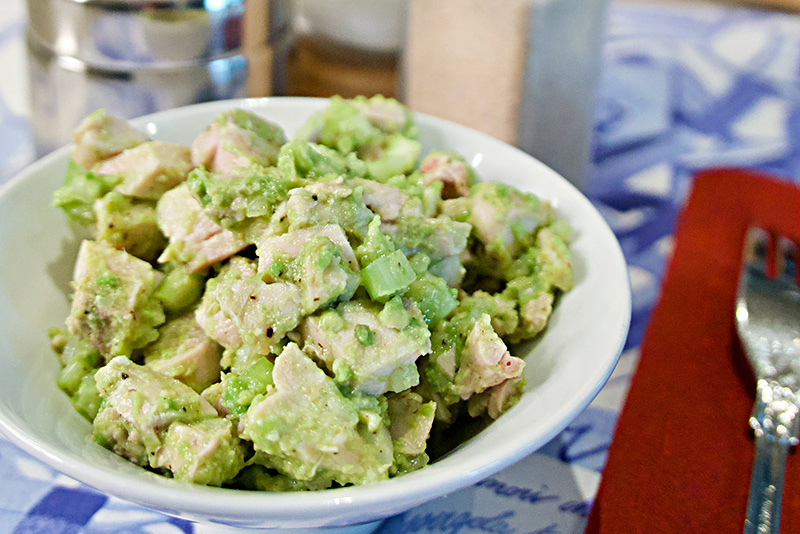Avocados make it more satisfying

One of the approaches we in nutrition are taking in the so-called "obesity crisis" is to look at ways to help people more successfully manage their food intake: what makes people feel more satisfied with what they eat so that they don't eat too much?
We've found that the feelings of both hunger and satiety (feeling comfortably full and satisfied) are controlled at least partially by certain hormones the body releases in response to eating. We've further found that consuming certain macronutrients help promote those feelings of hunger and satiety: protein is most often cited as a key macronutrient for inducing satiety, with fat close behind.
Until recently, however, all fat was considered bad for you. We've now learned that the evidence is nuanced even with regard to fats, with some types of fats actually being good for you.
Avocados are a great example of ingredients that until recently were considered bad for you because they are comparatively high in fat. Yet the fats in avocados are primarily monounsaturated fats - good fats - and they're also high in fiber.
Researchers affiliated with the Institute for Food Safety and Health at the Illinois Institute of Technology designed a study to find out 1. how adding avocado to a meal in place of similar amounts of carbohydrates would affect the blood levels of hunger-related hormones, and 2. whether avocados would affect how satisfied people felt after the meal (Nutrients 2019; 11, 952; doi:10.3390/nu11050952).
Thirty-one men and women between the ages of 20 and 65 were recruited to participate in their feeding study. The participants were all clinically overweight (Body Mass Index over 25) who were otherwise healthy but had elevated fasting glucose and insulin levels, indicating that they were pre-diabetic.
In random order separated by 7-10 days, each participant visited the lab to eat one of three breakfasts, all of which were a bagel sandwich, oatmeal, fruit, and a lemonade drink. One breakfast was low-fat, high carbohydrate (the control meal), one was a similar meal with the addition of a half of an avocado on the sandwich, and the third was a similar meal with the addition of a whole avocado on the sandwich.
The authors kept the total number of calories virtually the same across all three meals by adjusting the sandwich fillings. The significant differences between the control and the two test meals was that 75% of the calories in the control meal came from carbohydrate and 14% from fat, while only 50% of the calories in the test meals came from carbohydrate and about 40% of the calories from fat. The percentage of calories from protein was kept close to 11% across all meals, while energy density was also kept the same.
Before eating breakfast and at intervals afterwards, the participants had their blood drawn for tests of hunger-related hormone levels as well as insulin and glucose levels. At the same time they responded to surveys asking them to estimate, on a scale of 0 to 100, how hungry they felt at that moment, how full they felt, and other ratings related to the subjective feelings of satiety and hunger.
The authors found that the meal with the whole avocado suppressed hunger more than either of the other two meals, although people felt neither more nor less full than the control breakfast and less full than if they had the breakfast including the half avocado. Similarly, their desire to eat more was lower after having either meal containing avocado than after having the control meal.
The meals containing avocado caused lower spikes in post-meal insulin levels than the control meal - which might be expected since the control meal contained a greater percentage of calories from carbohydrates. What's unusual is that the control meal caused a greater dip in levels of the so-called "hunger hormone," ghrelin, than either of the meals containing avocado. Ordinarily lower levels of ghrelin would be expected to coordinate with greater feelings of hunger. At the same time, however, the avocado-containing meals caused higher levels of two other hormones, glucagon-like peptide and peptide yy, that are concerned with greater insulin secretion and increased satiety, respectively.
The authors conclude that these greater feelings of satiety and lower insulin spikes with more avocado suggests that "how satiety is achieved through biological signaling may have important implications," and that the "metabolically healthy responses" combined with greater satiety when including avocados in a meal warrants further investigation of both avocados and "other fat-fiber combinations."
What this means for you
As the authors admit that it would have been useful to follow the breakfasts with a standardized lunch meal to see if having the avocado meal meant eating less at lunch. They also admit (as they are required) that the study was funded by the Hass Avocado Board.
Sources of funding aside, this study suggests that substituting the same number of calories from carbohydrates with calories from avocado may help manage your insulin levels and keep you more satisfied. What's not in question is that avocados contain lots of good fats as well as a fair amount of fiber, making them a great substitute for other fats like mayonnaise. Here are some recipes that do just that: Tuna and Avocado Salad
Avocado Potato Salad
Egg Salad with Avocado
Chicken Salad with Avocado
Avocado-Lime Dressing
Avocado Dressing
First posted: June 5, 2019




